Key takeaways:
- Anti-war activism is rooted in core values of peace, justice, and humanity, emphasizing the importance of personal narratives and open dialogue to shift perspectives.
- Advocacy training provides essential skills such as strategic communication, active listening, and public speaking, which enhance the effectiveness of activism.
- Real-world applications of training, such as storytelling in community forums and facilitating discussions, highlight the power of genuine connection in motivating action.
- Future goals in anti-war efforts include fostering community collaborations and leveraging digital platforms for broader outreach and educational initiatives about the realities of war.
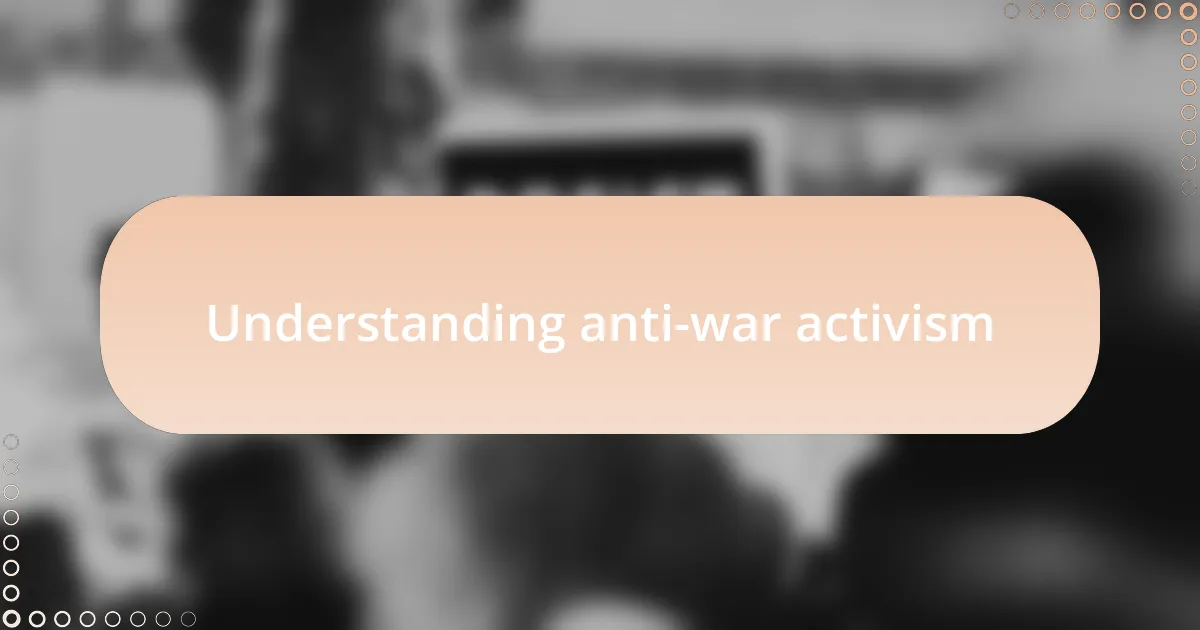
Understanding anti-war activism
Understanding anti-war activism requires recognizing its core values—peace, justice, and humanity. I often find myself reflecting on the many protests I’ve attended, where voices united in hope for a world free from violence. It makes me wonder, how can we harness that collective energy to create lasting change?
At its heart, anti-war activism is about challenging the status quo. I remember a heated discussion I had with a friend who initially believed war was a necessary evil. Through open dialogue, we explored the devastating impact of conflict on communities, and I could see the shift in his perspective. Isn’t it powerful how conversation can open minds and shift hearts?
Moreover, anti-war activism is deeply personal. My encounters with veterans who’ve shared their stories of trauma brought home the harsh reality of war’s toll. What if we all took the time to listen to these experiences? Understanding the human cost of conflict can ignite our passion for advocacy and inspire us to take action.
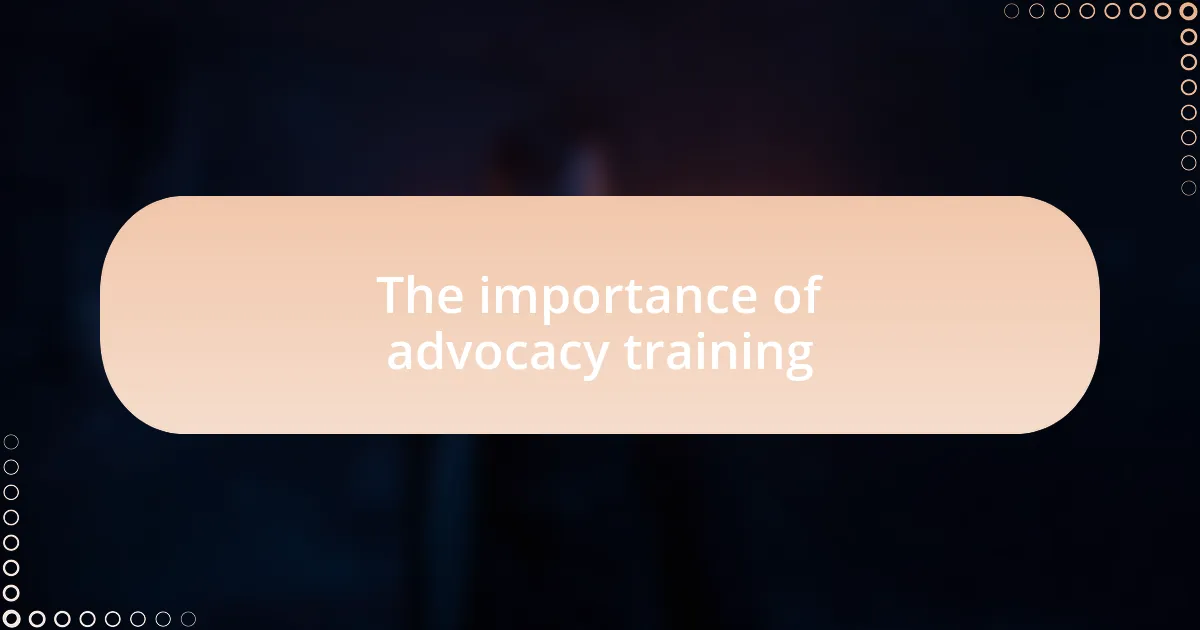
The importance of advocacy training
Advocacy training is crucial for transforming passion into effective action. I remember when I first attended a workshop; it was eye-opening to learn how strategic communication could amplify our anti-war message. Have you ever considered how different approaches can resonate more with specific audiences? That training taught me the nuances of tailoring messages to make them impactful.
In my experience, advocacy training equips us with essential skills, like public speaking and negotiation tactics. After learning these techniques, I felt more confident rallying people around our cause. It’s fascinating to see how a well-structured argument can ignite a room. Have you ever felt the energy shift when a passionate speaker takes the stage? It’s a reminder of the power we hold to influence change.
Furthermore, such training fosters a community of like-minded individuals committed to a common goal. When I participated in a local advocacy group, I was struck by the sense of belonging and mutual support. Sharing stories and strategies not only strengthened our resolve but provided emotional resilience. Isn’t it comforting to know that we’re not alone in this fight for peace?
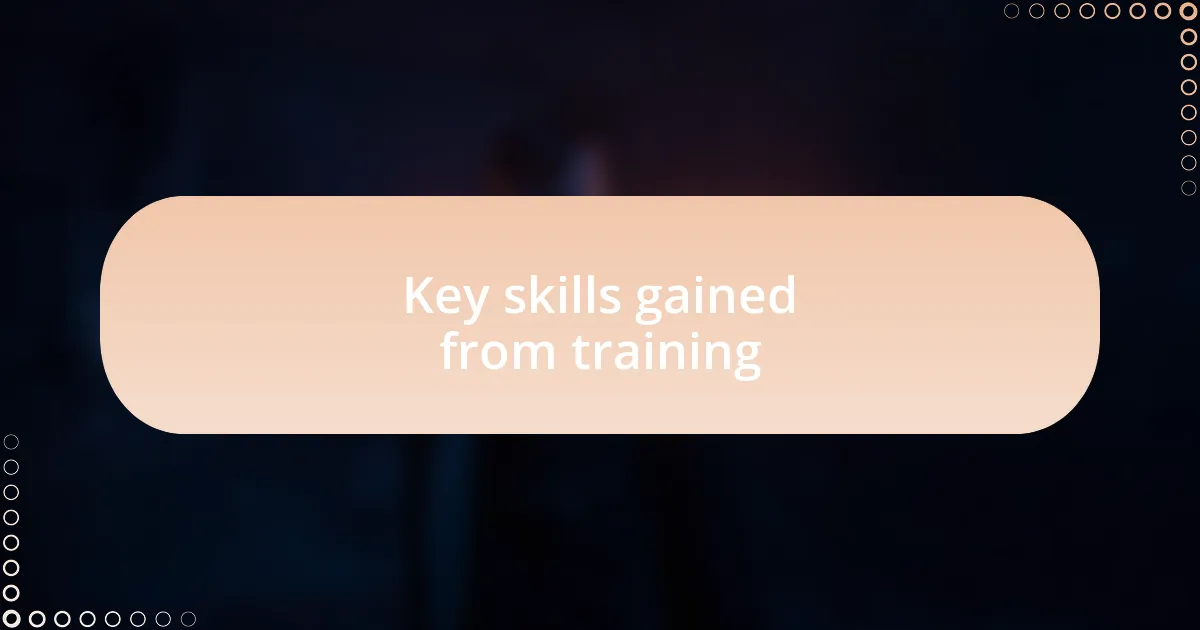
Key skills gained from training
One of the key skills I gained from advocacy training is the ability to craft compelling narratives. During a session focused on storytelling, I realized how sharing personal experiences can move people to action. Have you ever listened to someone’s story and felt a deep connection? It’s that authenticity that can turn listeners into advocates themselves.
Moreover, the training emphasized the significance of active listening. I recall an exercise where we practiced reflecting back what others said. This built trust and opened the door for genuine dialogue. How often do we rush to present our viewpoints without truly hearing others out? This skill not only enhances communication but also fosters collaboration in our efforts.
Lastly, I learned the value of strategic planning. In one workshop, we mapped out action steps for a campaign, focusing on objectives and timelines. It was enlightening to see how a structured approach could guide our energy effectively. When was the last time you thought about your goals in such detail? This skill helps ensure that our passion translates into tangible results, rather than just fervent discussions.
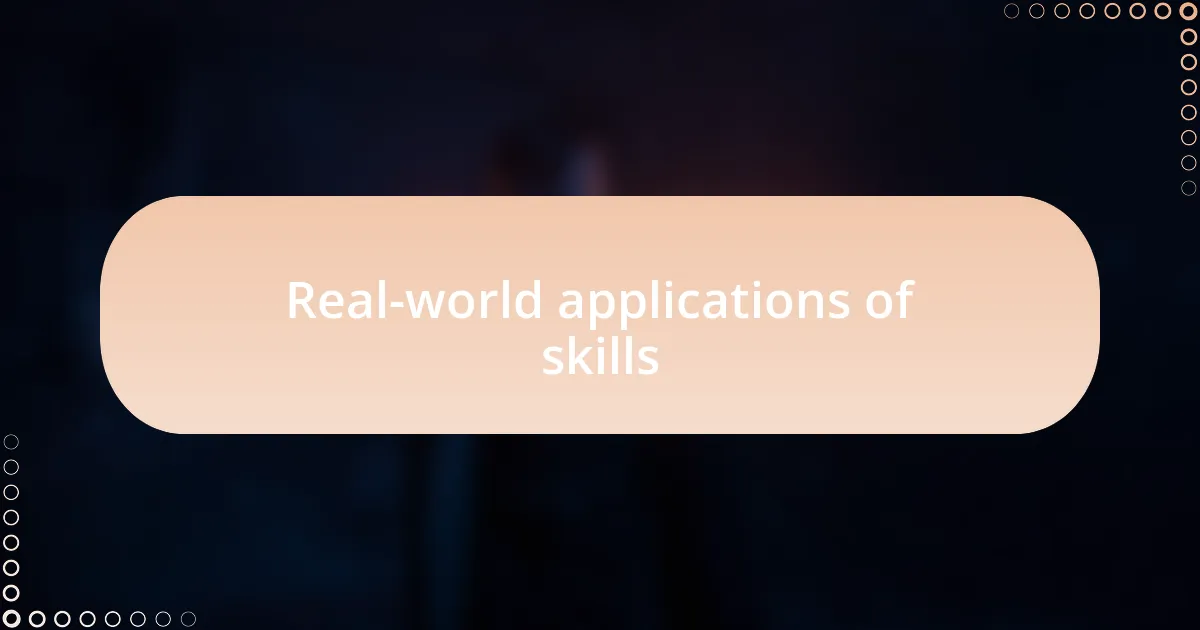
Real-world applications of skills
When it comes to applying the skills I’ve gained from advocacy training, one standout experience comes to mind. I remember attending a community forum where I used my storytelling ability to highlight the impact of war on local families. Seeing the audience visibly moved by my words made me realize how powerful a well-told story can be in motivating action and creating change. Isn’t it remarkable how one shared experience can spark collective empathy and engagement?
Another practical application emerged when I found myself facilitating a discussion during a local peace activism meeting. Drawing from my training in active listening, I encouraged participants to share their perspectives without interruption. I noticed a palpable shift in the room as people began to genuinely connect, leading to more fruitful conversations. How often do we skip over the vital step of truly hearing one another? In that moment, I understood firsthand the importance of fostering an environment where everyone feels valued and heard.
Strategic planning became an invaluable asset during a recent campaign launch I helped coordinate. With the skills I acquired, I was able to help break down complex strategies into manageable steps, allowing our team to stay focused and motivated. It was rewarding to see our efforts culminate in a well-attended event that raised significant awareness and funds. Have you ever felt the thrill of watching a plan come together? For me, it underscored the importance of preparation and clear-cut objectives in transforming our passion for peace into real-world impact.
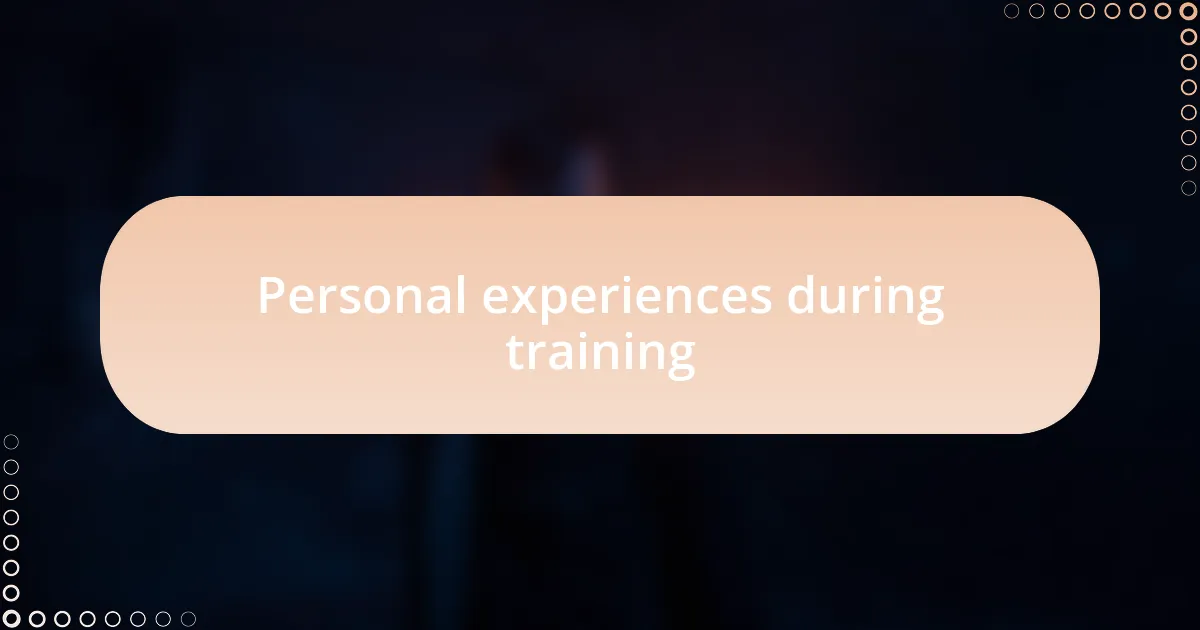
Personal experiences during training
During the advocacy training, I remember the moment I was asked to role-play as an opponent of peace initiatives. At first, it felt uncomfortable, but it pushed me out of my comfort zone and allowed me to see the issue from a different perspective. It was eye-opening to realize that understanding opposing viewpoints is crucial in order to develop effective strategies. How often do we challenge ourselves in that way?
In another session, we participated in group exercises simulating real-life scenarios. One exercise involved drafting a press release on a fictitious anti-war rally. I felt a rush of adrenaline as I worked with my teammates, debating what key messages to convey. It reminded me of the importance of collaboration; our diverse ideas came together to create something impactful. Isn’t teamwork an often-overlooked power in advocacy?
There was an instance during training when we explored personal narratives in depth. I chose to share my own family’s experience with the effects of war, and as I spoke, I could see tears in the eyes of a few participants. That level of vulnerability fostered a deeper connection among us, revealing how sharing our truths can strengthen our cause. Have you ever felt that sense of unity when strangers connect through shared pain? It’s a reminder of why healing and advocacy go hand in hand.
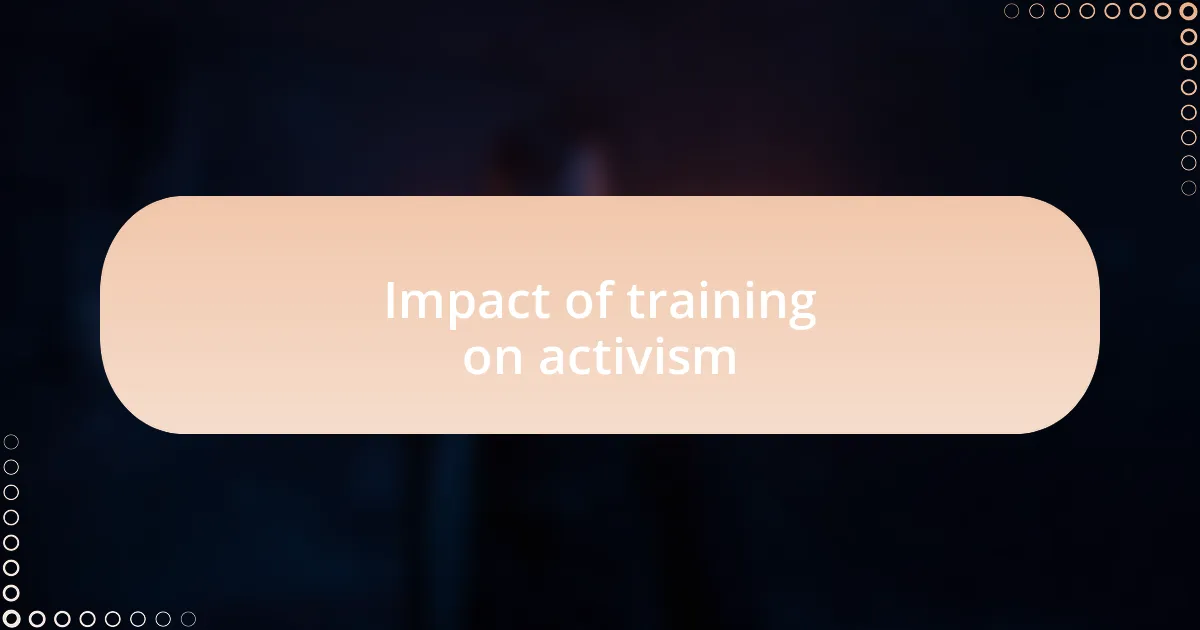
Impact of training on activism
Training has a profound impact on how we approach activism. I recall a workshop focused on strategic communication, where we learned to craft compelling narratives. By the end of the session, I realized that the stories we tell can ignite passion and mobilize communities. Have you ever considered how powerful your own story could be in advocating for change?
One memorable moment came when we practiced public speaking techniques. I was terrified when it was my turn, but I soon found that articulating my beliefs in a clear and confident manner made a significant difference. This experience taught me that how we present our message can significantly influence its reception. Isn’t it fascinating how confidence in delivery can bolster the effectiveness of our activism?
Moreover, the training underscored the importance of strategic planning in activism. We engaged in activities that required us to map out our objectives and identify resources. I learned that having a solid plan can transform a passionate idea into a structured campaign. Isn’t it empowering to know that systematic thinking can enhance our efforts in advocating for peace?
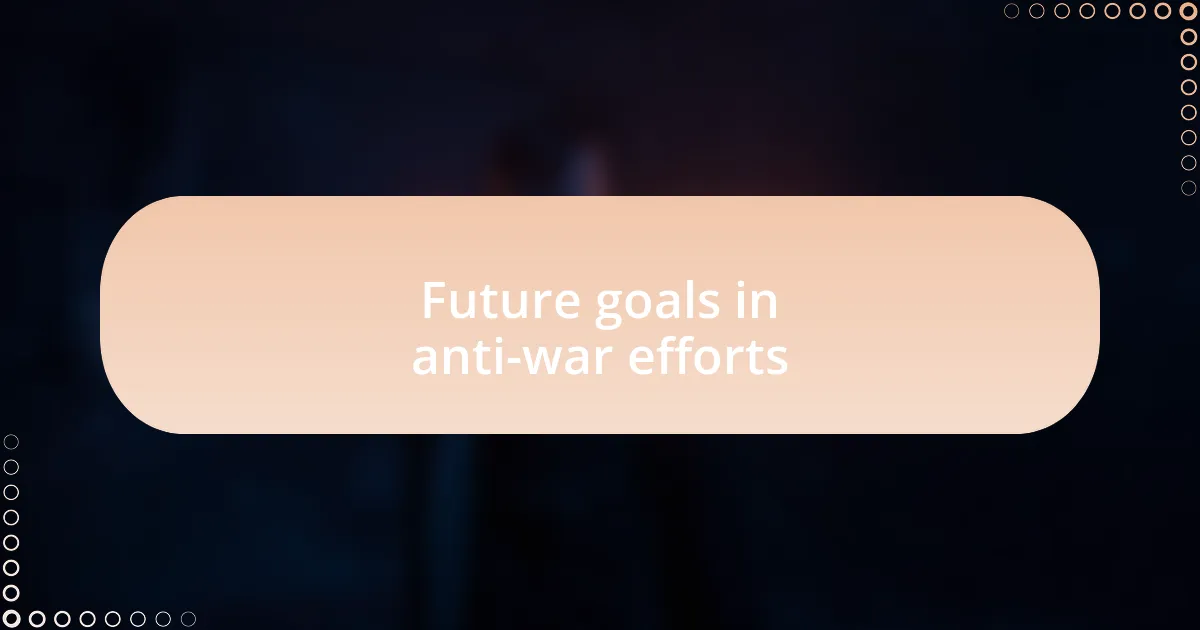
Future goals in anti-war efforts
As I look ahead to the future of anti-war efforts, I can’t help but feel a sense of responsibility to foster deeper community connections. During my training, I realized that collaboration can amplify our voices. Have you ever considered how building alliances with other organizations could strengthen our impact? By integrating our efforts, we can create a more formidable force against the injustices of war.
One of my goals is to leverage digital platforms more effectively. After participating in a session about social media strategies, I saw firsthand how online campaigns can reach a global audience. I remember when a single post I made sparked a discussion on international platforms, drawing attention to an overlooked issue. Isn’t it inspiring to think that one click can ripple out and touch lives far beyond our immediate circles?
In addition, I aspire to enhance educational outreach about the realities of war. The training made it clear that knowledge is a powerful tool in advocacy. It’s compelling to think about how I can use workshops, discussions, and informational campaigns to inform others. Have you thought about how your voice can be a beacon for those who may feel powerless? I’m determined to help ignite that flame in others, so together we can challenge the narratives around war.